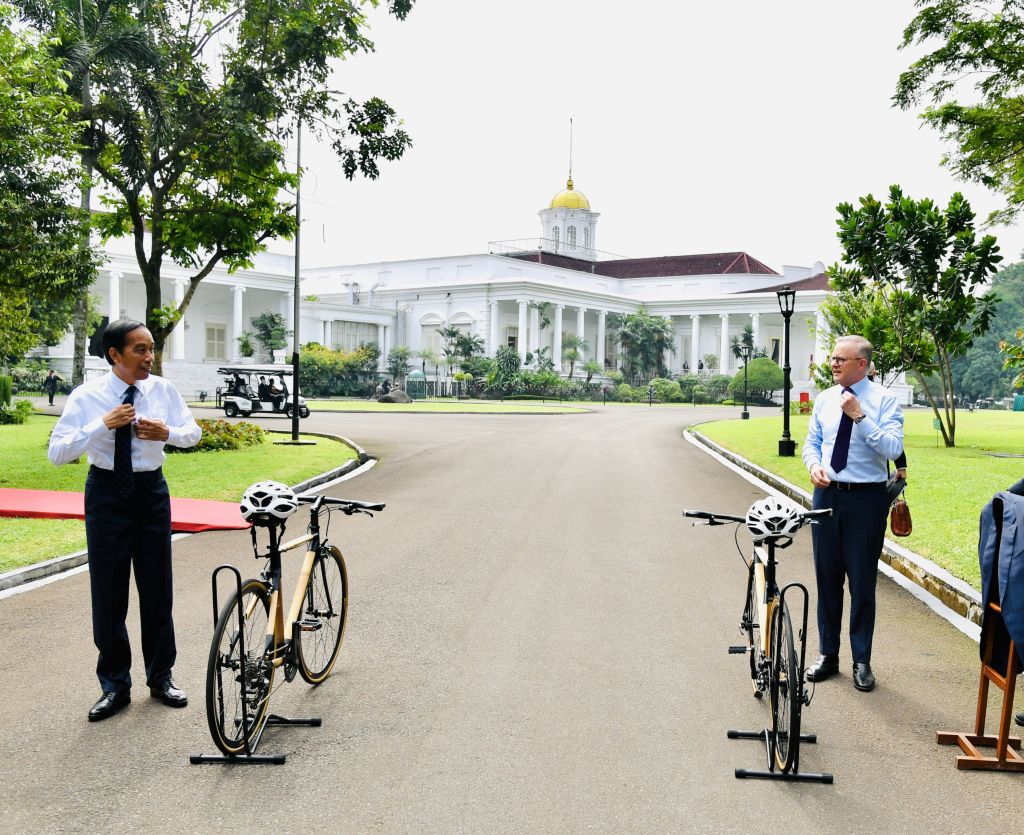
Indonesian President Joko Widodo will meet with Prime Minister Anthony Albanese in Sydney this week on his third (and possibly last) state visit to Australia, a country he once referred to as being Indonesia’s ‘closest friend’.
Few would argue against the claim that the relationship has been doing well. But being the closest of friends requires a higher concerted effort in addressing areas of distrust, as well as a degree of alignment in strategic visions—the latter of which is difficult to see materialising.
Friendship among states is driven by shared strategic and material interests and deepened by understanding, both at the political level and through business and cultural ties. Despite the positive trajectory in the past few years, the future of the Australia–Indonesia relationship is threatened with either stagnancy or divergence if we pursue differing strategic visions for our region.
Albanese and Widodo’s amicable bicycle ride on Indonesian presidential palace grounds in Bogor last year symbolised the recent positive progress in the relationship. The comprehensive strategic partnership signed in 2018 was filled with many promises of future cooperation, and demonstrated high aspirations for the relationship.
Following the implementation of a comprehensive economic partnership agreement in 2020, trade and investment ties have steadily developed. And defence engagement, the bedrock of the relationship, is on an uptick. Bilateral ties were upgraded in February to reflect a security relationship that has deepened in the past two years with increased dialogue and more joint training.
These developments sound even better when we consider that when Widodo first came to power in 2014, the relationship was still recovering from the 2013 phone-hacking scandal, when Australian intelligence services targeted key members of the Indonesian political elite. Ties would suffer further after Indonesia executed Australian drug smugglers Andrew Chan and Myuran Sukumuran in April 2015. In response to each incident, the countries recalled their ambassadors.
Fortunately, friends can only stay angry at each other for so long. Common security concerns, ranging from the rise of Islamic State to persistent problems with people smuggling, meant that cooperation was a necessity. With a high-profile visit by prime minister Malcolm Turnbull to Jakarta in November 2015, the relationship was on the mend.
There is considerable historical mistrust to overcome. For Australia, the relationship has long been haunted by the spectre of Indonesia’s authoritarian past and the problem of human rights abuse. While Indonesia has developed into an imperfect but still stable democracy, continued risks of human rights abuses easily become political fodder in Australia that threaten to damage ties.
Meanwhile, Indonesians hold fears of Australian (and US) interference in its domestic affairs, rooted in the debacle that followed the fall of Indonesian leader Suharto and the Timor-Leste referendum. While Australia has committed to respecting Indonesia’s territorial sovereignty, the historical memory of intervention continues to linger. Although still very fringe, some officials still hold concerns about the possibility of Australian involvement in the independence movements in West Papua.
Against these historical deadweights in the relationship, there have been plenty of moments of cooperation—from Australia’s support for Indonesian independence to the mutual provision of assistance amid humanitarian crises, and cooperation on counterterrorism and counter-people-smuggling.
Beyond the ups and downs of particular bilateral irritants, the relationship will depend heavily on strategic calculations.
And there’s the risk that disappointment in the relationship will be compounded by diverging pathways in responding to dynamics in great-power competition. In many ways, the 2020s will continue to be an era defined by power politics and the tensions in Sino-American rivalry.
Both Australian and Indonesian officials have expressed concerns about the implications of China’s growing power and the prospects of great-power rivalry.
Both also share a longstanding preference for keeping the US militarily, diplomatically and economically engaged in their shared neighbourhood. But they differ in their preferred approaches to respond to great-power competition.
Australia is more steadfast in its preference for US leadership. With the AUKUS security partnership, among other things, Canberra is deepening its cooperation with Washington and looking to use the alliance—along with strengthened partnerships with other like-minded nations—as a driver of greater regional stability.
Indonesia, meanwhile, has remained deeply committed to managing relations with major powers, including the US and China, by engaging them in the layers of multilateral cooperation centred on ASEAN.
These divergent approaches have created another source of tension. While Indonesian officials—including Widodo himself—seem to be warming up to the idea that both the Quad and AUKUS offer as many opportunities for Indonesia as they do challenges, that shouldn’t be mistaken as an overt form of endorsement of Australian and US balancing against the rise of China.
Despite some anxiety in Jakarta about the implications of China’s growing military and economic power, there are deeper concerns about the effects Sino-American rivalry will have not only on Indonesia’s security but also on its prospects for development. Furthermore, minilateral arrangements focused on China hit at the heart of Indonesia’s own anxieties about its status as an activist middle power in the Indo-Pacific.
Given its longstanding status as ‘first among equals’ in ASEAN, Indonesia has long depended on ASEAN centrality as a means of signifying its middle-power credentials. The emergence of minilateral arrangements risks eroding Indonesia’s preference to ensure that ASEAN stays as the driver of regional order.
While Australia and Indonesia didn’t choose to be neighbours, they have chosen to be friends. But the test of this friendship lies in how they can communicate their differences. Overcoming these challenges require a willingness to mutually hash out and discuss the hard topics that cause the most sensitivity in the bilateral relationship, including how to manage great-power competition (particularly the rise of China) and how to respond to a potential crisis in West Papua.

